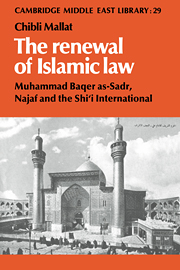Book contents
- Frontmatter
- Contents
- Acknowledgments
- Note on transliteration and dates
- General introduction: The law in the Islamic Renaissance and the role of Muhammad Baqer as-Sadr
- Part I Islamic law and the constitution
- Part II Islamic law, ‘Islamic economics’, and the interest-free bank
- Conclusion: The costs of renewal
- Notes
- Bibliography
- Index
- Cambridge Middle East Library
General introduction: The law in the Islamic Renaissance and the role of Muhammad Baqer as-Sadr
Published online by Cambridge University Press: 08 January 2010
- Frontmatter
- Contents
- Acknowledgments
- Note on transliteration and dates
- General introduction: The law in the Islamic Renaissance and the role of Muhammad Baqer as-Sadr
- Part I Islamic law and the constitution
- Part II Islamic law, ‘Islamic economics’, and the interest-free bank
- Conclusion: The costs of renewal
- Notes
- Bibliography
- Index
- Cambridge Middle East Library
Summary
Law as Lingua Franca
In recent years, a renewed interest in Islam as a worldwide active social phenomenon has appeared. This has resulted in a flurry of works of sundry types on the theme of resurgence, revivalism, re-emergence of political Islam, also dubbed revolutionary Islam, radical Islam, militant Islam, Islamic fundamentalism, or more simply Islamism.
The issue of Islam as a socially turbulent phenomenon was approached by countries and disciplines: history, sociology, anthropology, politics. Questions were being posed in the worried and intrigued West, but they were also being asked in the East, where answers had an immediate political relevance. Naturally, the concerns were different according to the groups' varied interests. The common underlying concern, however, was for stability, or its converse, foiled or successful revolution. Depending on the position of a group in a particular state, fear, concern, or hope alternated.
This research tries to look into the thought of the resurgent Islams behind the first layer of enthusiasm or despair, to determine how the new vindicated outlook was shaped, and to examine whether there were any new ideas in the alternative system at all. In this longer perspective of the history of ideas, ideas could be ‘new’ only in comparison with earlier outlooks.
- Type
- Chapter
- Information
- The Renewal of Islamic LawMuhammad Baqer as-Sadr, Najaf and the Shi'i International, pp. 1 - 20Publisher: Cambridge University PressPrint publication year: 1993
- 1
- Cited by



